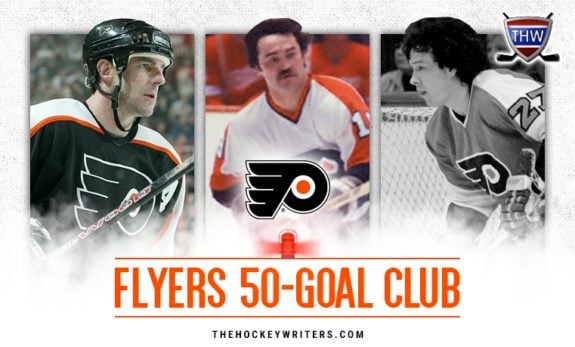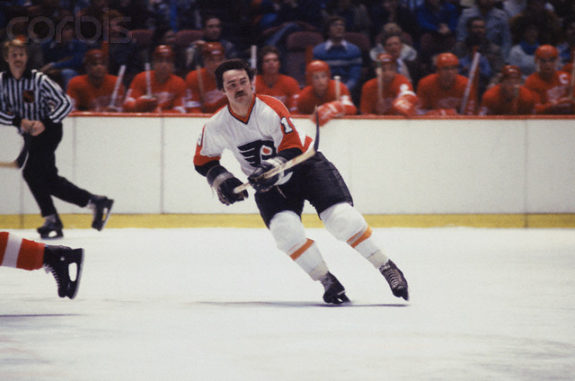Coming into the NHL in the 1967 NHL Expansion, the Philadephia Flyers have put together a storied history that includes numerous Hockey Hall of Fame players and two Stanley Cups.

Over their existence, the team has had six different players hit the 50-goal plateau, a mark that is becoming more-and-more difficult to hit for players not named Alex Ovechkin. Here’s a look back at those who were able to hit the difficult milestone.
The Flyers’ Almost-50-Goal Scorers
While there have only been six players to date to score 50 goals in a season for the Flyers, a few more have come painfully close. In 1995-96, Eric Lindros scored 47 goals (along with 68 assists and 115 points), which would remain his career-high.
A decade later in 2005-06, Simon Gagne scored 47 goals, as well. Like Lindros, this would remain his career-high. Finally, in 2008-09, Jeff Carter scored his own career-mark, 46 goals. While other players have hit the 40-goal plateau, these three are the ones that were the closest.
Rick MacLeish
Member of the Flyers’ 50-Goal Club
Scored 50 goals in 78 games during the 1972-73 season.
Despite being drafted by the Boston Bruins fourth overall in the 1970 NHL Amateur Draft, Rick MacLeish never suited up for Boston. Instead, he was traded to the Flyers where he would spend the first 11 seasons of his career.

MacLeish jumped into the league full-time for the 1972-73 season, immediately making a massive impact. That first season was his career-high for goals (50), assists (50) and points (100). It was the first time ever in the Flyers short history that a player had his the 50-goal plateau.
The Canadian centreman was a part of the famed Broad Street Bullies and helped the Flyers to win their only two Stanley Cups in 1974 and 1975. In that 1974 Cup run, MacLeish led the playoffs in goals (13) and points (22). The next season’s Cup run saw him lead once again in points (20). Needless to say, he was an instrumental piece for the Flyers in the Broad Street Bullies era.
While he didn’t score 50-goals again in his career, he hit 30 goals six other times for the Flyers, including one very close finish in 1976-77. That season, MacLeish scored 49 goals and finished with 97 points, nearly replicating his 50-goal, 100-point performance from a few seasons prior.
After leaving the Flyers for the 1981-82 season, MacLeish saw his production drop significantly, never hitting the 20-goal mark in his final three campaigns. Part of the 1983-84 season even saw him return to Philadelphia, but he was later traded to the Detroit Red Wings.
MacLeish remains a Flyers legend though, for being the first to hit 50 goals, and helping the team to two Stanley Cups.
Reggie Leach
Two-time Member of the Flyers’ 50-Goal Club
Scored 61 goals in 80 games during the 1975-76 season.
Scored 50 goals in 76 games during the 1979-80 season.
MacLeish wasn’t alone in the Broad Street Bullies days, he had a lot of help. One of those players was Reggie Leach, who just happens to have been a two-time member of the Flyers’ 50-goal club.

Leach was traded to the Flyers from the California Golden Seals in the offseason of 1974. They were coming off their first-ever Stanley Cup win and looking for another. With their new acquisition added to the fold, they did just that, winning a second-straight Stanley Cup and Leach’s only Cup.
In that first season with Philadelphia, Leach came close to the 50-goal mark, collecting 45. In his second season is when he hit the mark for the first time in his career. He led the league with 61 goals and set his career-high in points with 91. His 61 goals remain the franchise record for goals in a single season.
In the playoffs that season, he scored another 19 goals, an NHL record that he shares with Jari Kurri for most goals in a postseason. For his performance, he won the Conn Smythe Trophy, becoming the only non-goalie to win the award despite being on the losing team. He also scored five goals against the Boston Bruins in Game 5 of the Eastern Conference Semifinals, another NHL playoff record that he shares with four other players.
In 1979-80, Leach hit the mark again, scoring 50 goals in 76 games. he went a point-per-game that season, with 76 points. Other than his two 50-plus goal seasons, Leach only had one campaign over 40 goals, that first season with the Flyers. He crossed 30 goals three other times.
Bill Barber
Member of the Flyers’ 50-Goal Club
Scored 50 goals in 80 games during the 1975-76 season.
When you are the all-time leading goal scorer for a franchise, it’s usually pretty likely to have at least one 50-goal season. That is the case for Bill Barber, who remains atop the franchise with 420 goals, including a 50-goal season in 1975-76.
That’s right, the Flyers were lucky enough to have two members join the 50-goal club in the 1975-76 season. The feat had only been done twice before, by the Boston Bruins in 1970-71 (Phil Esposito and Jonny Bucyk) and again in 1973-74 ( Esposito and Ken Hodge). Although, the Pittsburgh Penguins did it in the same season as well as the Flyers (Jean Pronovost and Pierre Larouche).
Barber spent his entire 12-year career with the Flyers, after being drafted seventh overall in the 1972 NHL Amateur Draft. He came out strong, hitting at least 30 goals and 60 points in each of his first three seasons. In 1975-76, he had his career-best finish, with 50 goals, 62 assists and 112 points. For the remainder of his career, he hit 40 goals four times and 30 once on top of that.
Barber was a part of the Flyers’ success in their back-to-back Stanley Cups in 1974 and 1975. While his playoff numbers didn’t jump off the scoresheet those seasons (nine and 15 points, respectfully), his presence on the ice alone was enough to keep opponents attention. He did go on to score 53 playoff goals over his time with the team, tied for first in franchise history with MacLeish.
Tim Kerr
Four-time Member of the Flyers’ 50-Goal Club
Scored 54 goals in 79 games during the 1983-84 season.
Scored 54 goals in 74 games during the 1984-85 season.
Scored 58 goals in 76 games during the 1985-86 season.
Scored 58 goals in 75 games during the 1986-87 season.
We’re moving out of the ’70s and into the ’80s, where the Flyer with the most 50-goal seasons can be found. Not exactly a household name around the league today, Tim Kerr was dominant for the team in the 1980s.

Some might say he got off to a slow start, including not being drafted but instead signing with the Flyers as a free agent in 1979. He started to make an impact right away though, scoring over 20 goals in his first two seasons and finishing with 45 and 51 points, respectfully. His third season in 1982-83 was held to just 24 games, where he had 11 goals. When he came back healthy the following season, he was ready to go.
Kerr scored at least 54 goals in four straight seasons from 1983-84 to 1986-87. He also finished with 93, 98, 84 and 95 points those seasons. He had two finishes of 54 goals, and two of 58 goals, which behind Leach’s 61 goals are the four next-best seasons in Flyers’ history.
While Barber leads the Flyers’ in all-time goals scored, it could have very easily been Kerr. His career was held back by numerous injuries, but he still leads the franchise in goals-per-game all-time (0.60).
Where Kerr found most of his success was on the power play. In those three 50-goal seasons, he led the league in power-play goals with 21, 34 and 26. He still leads the franchise in this category, with 144.
In the 1987-88 season, Kerr was held back by injuries again, playing just eight games. But he came back the following season to play 69 and score 48 goals – 25 of which were on the power play. After that, he played just four more seasons, never more than 40 games, before retiring in 1993.
Mark Recchi
Member of the Flyers’ 50-Goal Club
Scored 53 goals in 84 games during the 1992-93 season.
In 22 seasons of NHL hockey, Mark Recchi played for seven different teams. But lucky for Flyers fans, he saved his best performance for Philadelphia.
Recchi was drafted 67th overall in 1988 by Pennsylvania rivals, the Penguins. He played his first three and a half seasons there, before being traded to the Flyers in 1992. This trade came after a season that saw him score 40 goals and 113 points and in the middle of a 43 goal, 97 point campaign.
This was just the first of two stints with the Flyers and although it was the shorter of the two (only two full seasons, with parts of two due to trades versus five and a half seasons later), it was arguably his best. That first full season in 1992-93 saw him pot 53 goals and finish with a franchise-leading 123 points.
Related: Recchi’s Record-Breaking 1992-93 Season
He hit 40 goals the next season as well, along with 107 points, the last time he’d hit either mark. He and Bobby Clarke remain the only two Flyers to have two 100-plus point seasons. Recchi only hit 30 goals two other times, but he did have a league-leading 63 assists in the 1999-00 season, in his second time with the Flyers.
When Recchi was traded away from the Flyers in 1995, he was sent to the Montreal Canadiens. A part of that return included the next player to score 50 goals for the Flyers.
John LeClair
Three-time Member of the Flyers’ 50-Goal Club
Scored 51 goals in 82 games during the 1995-96 season.
Scored 50 goals in 82 games during the 1996-97 season.
Scored 51 goals in 82 games during the 1997-98 season.
In 1995, the Canadiens gave up on young player John LeClair after never hitting 20 goals or 50 points. In the season that he was traded, he ended up hitting both for the first time, with 26 goals and 54 points. It only got better from there.

Leclair’s next three seasons saw him explode, with 51, 50 and 51 goals, as well as 97, 97 and 87 points. He proved any doubters wrong very quickly. He ended up playing 649 games with the Flyers, scoring 333 goals, 310 assists and 643 points.
Related: John LeClair Hall Of Fame Worthy
Playing with a superstar like Eric Lindros as a part of the Legion of Doom certainly helped LeClair’s statistics, but there’s no questioning the talent he brought to the line. LeClair joined Lindros and Michael Renberg in his first game with Philadelphia, seeming to energize the other two while consistently putting the puck in the net.
LeClair and the Legion of Doom helped the Flyers back to the Stanley Cup Final in the 1996-97 playoffs, where LeClair had nine goals and 21 points in 19 games. They ended up getting swept by the Detroit Red Wings.
After the 1997-98 season, the Legion of Doom was over and LeClair’s production started to drop. He finished with 43 and then 40 goals in the following two campaigns, and didn’t hit 30 in his final six seasons. With his success during his peak, LeClair is one of the best to ever play for the Flyers.